Country Roads, Take Me Homo is an ongoing series chronicling Ty Yule’s experience at small town Pride events across America.
For my fifth small-town Pride destination I was excited my wife, Katrina, and our dog, Wally, finally had time to join me. Fate steered us to Poteau, Oklahoma.
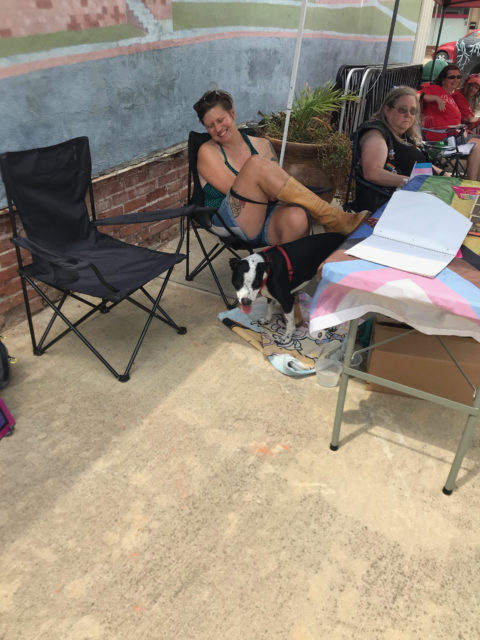
Neither of us had been to Oklahoma and so we were off on another Pride adventure to the South. The organizer got back to me quickly and seemed happy we wanted to come but warned me the city would want a $250 vendor fee if I planned to sell books. I decided I’d just give them away to whomever wanted one. I figured that would be an even better way to meet people.
We stopped in Kansas City for dinner and stayed the night in Joplin, Missouri. The next day, our drive into Poteau took us back through the Ozarks, giving Katrina the chance to see region’s forests and gorges. We debated whether Wally would protect us from backwoods crime syndicates. Wally seemed more concerned by the lack of dog parks.
We entered Poteau through a residential neighborhood dotted with mid-century brick ramblers on large, irregular, well-kept lots. We stopped at a gas station near the old-fashioned metal sign announcing the entrance to Poteau’s downtown.
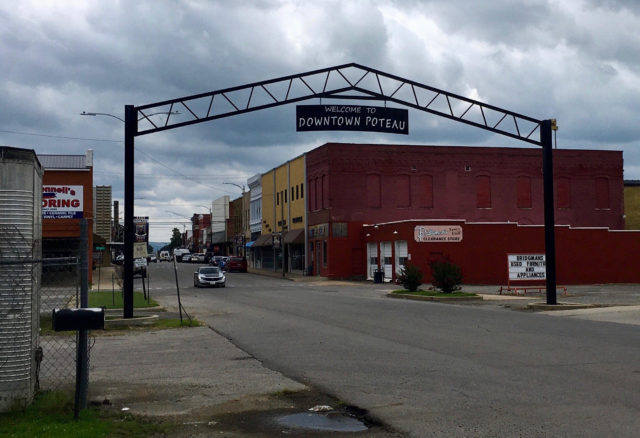
Katrina asked the cashier where Pocket Park, where we’d been instructed to go, was. He looked confused, but a warm woman in line smiled and said, “It’s just a couple more blocks down this street, sugar. There’s already a bunch of people there.”
Pocket Park turned out to be merely a void in the block-long row of century-old storefronts. It looked as if one of the stores had been torn down and the lot paved over. The town had put in a few picnic tables, a stage, and a concession stand and now used the space for community events.
The organizers were easy to spot in their matching t-shirts. They pointed me to Spencer, a genderqueer youth enthusiastically answering multiple questions from all directions. Spencer pointed me to an unclaimed tent opposite theirs on the other side of the plaza. I was grateful for the shade since we’d be spending the rest of the 100-degree day in a small, uncovered concrete square.
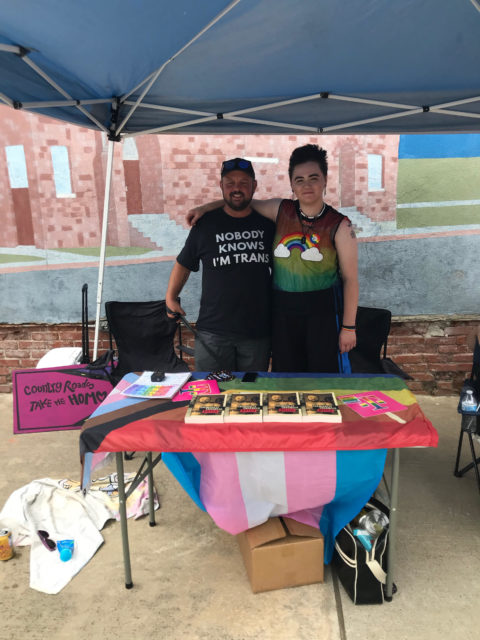
After setting up, Shelby, another organizer, came over to welcome us and say hi to Wally. Shelby was also genderqueer. When I asked what inspired them to organize a Pride, they explained they’d been out to lunch with Spencer at a Chinese restaurant downtown, talking about how great it would be to have a Pride in Poteau (rhymes with photo, I finally learned).
Shelby said the next time they met, Spencer had already done most of the preliminary research into how to throw a public event in their town and now just needed help organizing and spreading the word. Both of them were nineteen. Neither had the full support of their parents. Shelby’s parents thought the event would be a violent riot. They had accepted Shelby’s identity, but didn’t like to talk about it and didn’t think a public event was appropriate.
As we were talking, a pickup flying huge American and Confederate flags rumbled past on Main Street, illustrating they did not likely have the full support of their town, either. They had gotten the permits and reserved the park anyway.
When Shelby left, a grandmother carrying a big rainbow flag came over. She had driven with her daughter and grandchild from a neighboring town. “I’m here for my grandbaby. He’s trans like you,” she said. Just then, a bouncy, curly-haired youth came up behind her, pointed to the trans flag on my table and said, “See, this is me, gramma.” Gramma rolled her eyes and smiled and asked how much my book was. I was happy to give her one and advised her to read it before giving it to her grandson.
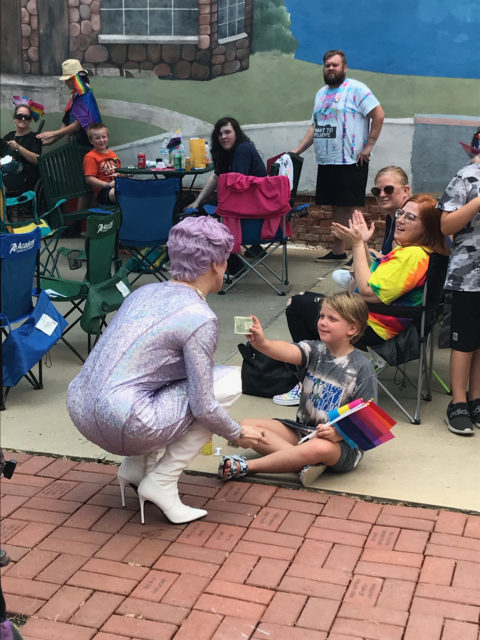
A person with a beard and short, uneven braids, wearing a flowy, patterned skirt came over and sat on my cooler. They introduced themselves as Valerian. Their partner, Snow, joined us. They’d driven in from Mena, Arkansas, a small town just over the border. Valerian and Snow had helped organize Mena’s first Pride that summer and wanted to show support for Poteau.
Valerian explained to us that in the wake of the George Floyd uprisings in 2020, Mena organized a BLM march. That event brought out the more progressive community members in their town and was an opportunity for that section of the population to get to know one another. A core group kept in touch and organized Pride to maintain progressive momentum in their conservative town.
I’d heard similar stories from organizers in Hardy, Arkansas and Stockholm, Wisconsin. It seemed like a logical theme for small towns having their first Pride in 2021, to be building on the energy created by organizing marches against police brutality and racial inequality in 2020. The uprisings around the country provided an occasion for small-town residents to identify themselves, paving the way for future actions while building like-minded communities.
Neither Valerian nor Snow were from the South. They ended up there because of Snow’s online communication with an older trans woman activist who happened to own a small farm in Mena. Now they were caring for the woman as her Alzheimer’s progressed. They hoped to make the farm more self-sustaining and eventually establish a community center in Mena.
Next, I had the pleasure of talking to Caden. I’d seen him practicing his high kicks in his thigh-high black suede heels on my way into the festival. He was also wearing a rainbow cardigan wrapped around his waist like a skirt over his gym shorts and a rainbow splattered t-shirt he’d made himself. He’d travelled there from nearby Panama, Oklahoma. He said he usually wore make-up, but his glitter had somehow gotten out of control that morning, so he had to take it off. He was still in high school, which he said was terrible, but was hoping to move to the west coast to become a special effects make-up artist someday.
The show started from the stage with a set by Zemi, a talented, young, gay singer and performer. He’d come all the way from Little Rock, Arkansas with three generations of his family as his support staff and promotions team. They occupied the tent to my right with CDs and t-shirts for sale. Zemi had been invited to perform here by one of the local drag kings who’d performed in Little Rock.
That’s when I noticed Alex, a drag king I’d met at my first small-town Pride in Hardy, Arkansas, was emceeing the drag show. He came over to give me a big gay hug and eventually had time to come over and chat.
Alex was 24 and held two ball titles. He was Mr. OKC Pride in 2019 and 2020. He gave it up to become Mr. Fort Smith Pride in 2021. He recently came out as trans and has a desire to medically transition but doesn’t have the money. He grew up in Gore, Oklahoma, population 703. Everybody there told him he was going to hell. He’s been in the ball scene for four years. It’s where he’s found community, opening his eyes to other kinds of queers.
Talking to him I thought about how there’s hardly any lesbian bars left in this country. I wondered how many of the queer youth today, who might have been lesbian bars’ key demographic thirty years ago, have been taken in by ball culture.
I don’t know if I’ve just been taking drag for granted or if RuPaul has been woven into the fabric of Americana, but drag seems to be especially prominent at small-town Prides. I’ve gotten to witness the connections and rivalries in regional networks of drag performers and their attendant entourages. I realized I hadn’t understood the reach and organization of this fundamental Queer institution. I’m happy to know Queer youth continue to find chosen families and create community even in the absence of bar culture and decay of Queer urban villages.
As the afternoon was winding down, I finally had a chance to sit down with Spencer. I’d heard from several of their friends that they were the driving force behind Poteau’s first Pride. Spencer identified as non-binary and pan. They grew up in Poteau. They just graduated high school and told me it wasn’t so bad. They said middle school was the worst. (Super fun gay fact: Poteau’s middle school is called Pansy Kidd Middle School)
Spencer was very charismatic. They found support from older community members with access to resources to help make the Pride happen. They inspired their peers to be brave. They seemed surprised and overwhelmed by the community response and the attendance, but I wasn’t. Spencer was a natural leader.
They have no plans to leave their hometown. They feel they have a calling to make their community safer and more welcoming for people like them. Spencer plans to register their organizing group as a non-profit and eventually open a community center for queer youth that also offers resources. I have no doubts about the success of their future projects.
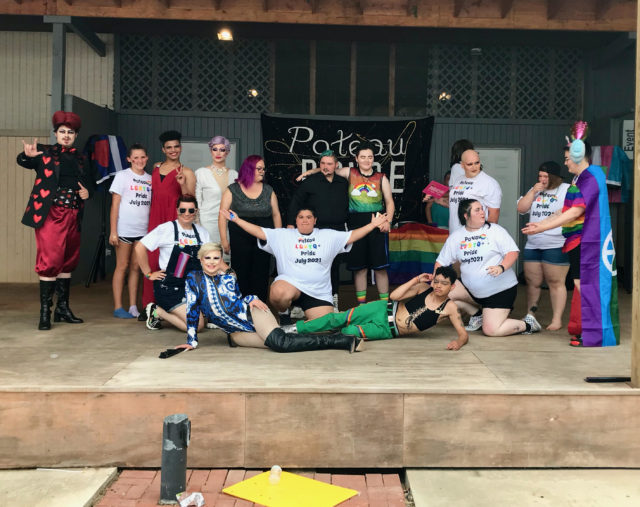
Since this was the first Pride I’d been to organized by people under 21, it was also the first Pride with no after party. Katrina and I said our goodbyes and packed the car. Wally seemed relieved to be back in the air-conditioning. I’m grateful Katrina got to see this Pride. It had all the squishy, sweet queer underdog triumphs and touching displays of unexpected familial support I wanted her to see.
But they all have that. Queers always create beauty and family out of precarious and isolating circumstances.
Next stop: Winnemucca, Nevada.

What Do You Think?